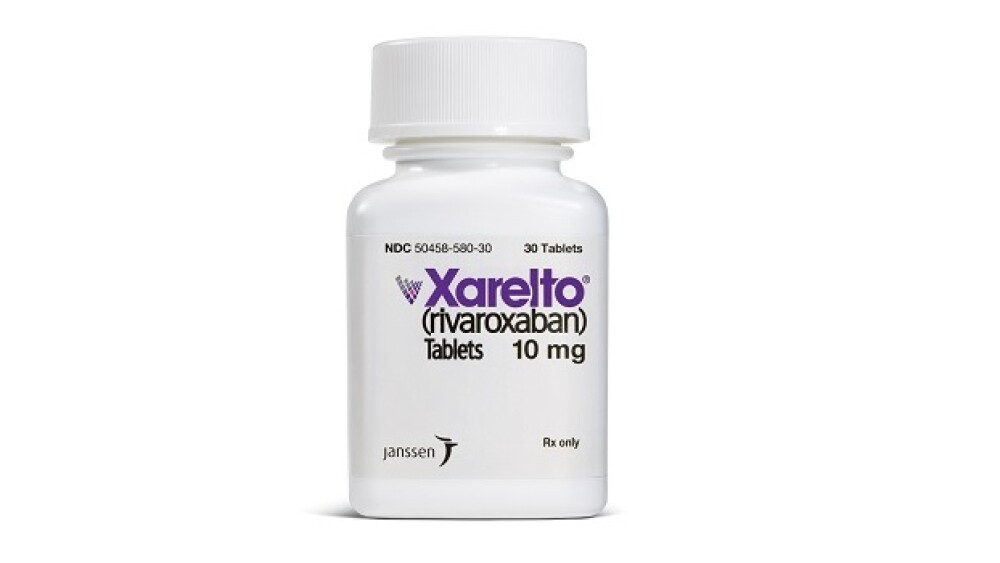While Xarelto failed to show statistical significance, Janssen said there was a clinically meaningful 60 percent reduction of VTE events compared to placebo during times of treatment.
Raihana Asral / Shutterstock.com
Janssen’s Xarelto failed to demonstrate a statistical significance in the management and prevention of venous thromboembolism (blood clots) in high-risk cancer patients during a late-stage trial.
While the study failed to reach statistical significance, Janssen, a division of Johnson & Johnson, noted that the use of Xarelto resulted in a clinically meaningful and nominally significant 60 percent reduction of VTE events compared to placebo while patients were receiving treatment. In what sounds like a mixed bag, Janssen added that bleeding rates were low overall, but higher with Xarelto.
For cancer patients, the threat of blood clots is a significant concern. While they can be largely treatable, blood clots are the second-leading cause of death in those patients. Venous Thromboembolism (VTE), which includes deep vein thrombosis (DVT) and pulmonary embolism (PE), has a much higher chance of developing in cancer patients. The risk is magnified in patients who receive chemotherapy. Janssen noted that guidelines recently issued by the International Society on Thrombosis and Haemostasis and National Comprehensive Cancer Network both recommend the use of Xarelto as an option for the treatment of cancer-associated VTE. As of now, there is no regulatory-approved treatment for the primary prevention of VTE in these patients.
Paul Burton, head of medical affairs for internal medicine at Janssen, said the company was encouraged by the results of the Phase III trial, dubbed CASSINI. Burton said the company will discuss the trial results with the U.S. Food and Drug Administration, as well as other regulatory agencies for a new indication for Xarelto, based on the latest data.
“This study underscores our longstanding commitment to exploring the full potential of Xarelto through our EXPLORER program. Most recently, Xarelto became the first and only Factor Xa inhibitor indicated for people with chronic coronary or peripheral artery disease,” Burton said.
In an interview with BioSpace, Burton said that overall the company was pleased with the 60 percent reduction of VTE events attributed to the use of Xarelto. Burton said the failure to reach statistical significance was largely due to the level of cancer in the patients who participated in the trial. All of the participants had Stage III or Stage IV cancers and some were forced to drop out of the trial due to their cancers. The loss of those patients caused the skew, which resulted in the trial falling just short of showing statistical significance, he said.
“These were very unwell people,” Burton said.
According to the study results, the trial’s primary efficacy endpoint of preventing the clots in upper and lower extremities, as well as VTE-associated death, in the intent-to-treat population occurred during the study in 8.79 percent of patients in the placebo group and in 5.95 percent of patients treated with Xarelto.
However, during the trial, researchers examined the endpoint in all randomized patients, during the time they were actively taking treatment, also called the on-treatment period. When this analysis was conducted, Janssen researchers noted that Xarelto was associated with a statistically significant 60 percent reduction in VTE events compared to placebo. It’s this data that Janssen will tout, along with a strong safety profile, when it meets with global regulatory agencies regarding a new indication.
The low bleeding rates, noted previously, occurred in less than one percent of patients on placebo and less than 2 percent of Xarelto patients. Janssen said the result was not statistically significant, but added that the study was not designed to detect that difference.
Additionally, Janssen said of the total VTE events that occurred, approximately 39 percent were experienced by patients who had prematurely discontinued treatment. Mortality, a secondary endpoint, was similar between both groups. For the majority of patients who died, Janssen said it was a result of their cancer, with only a small number of VTE-related deaths.
Alok Khorana, director of the GI Malignancies Program at the Cleveland Clinic and the lead investigator on the CASSINI trial, said that the trial data, supported by previous research into Xarelto and VTE, signals the role of Xarelto as a preventative for blood clots. In the previous SELECT-D trial, Xarelto was associated with significantly lower rates of recurrent VTE compared to low-molecular weight heparin in cancer patients.
The trial included patients with a wide variety of cancers, with about one-third being pancreatic cancer patients. Patients with that type of cancer are particularly susceptible to VTEs.





